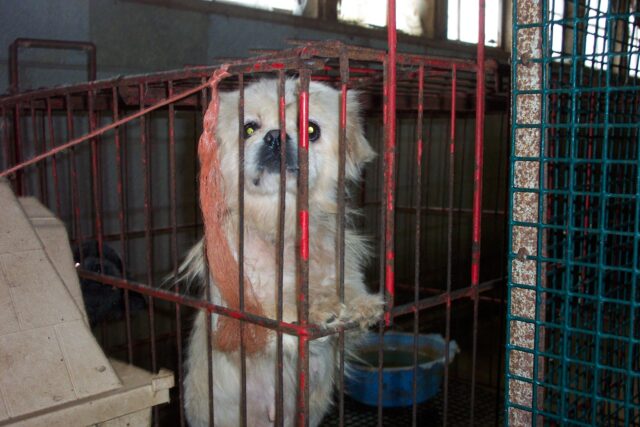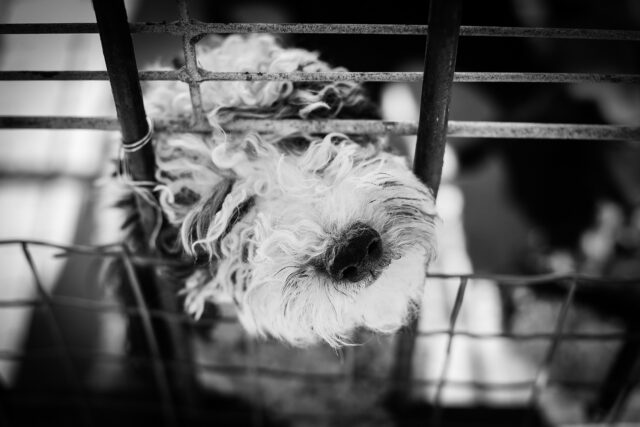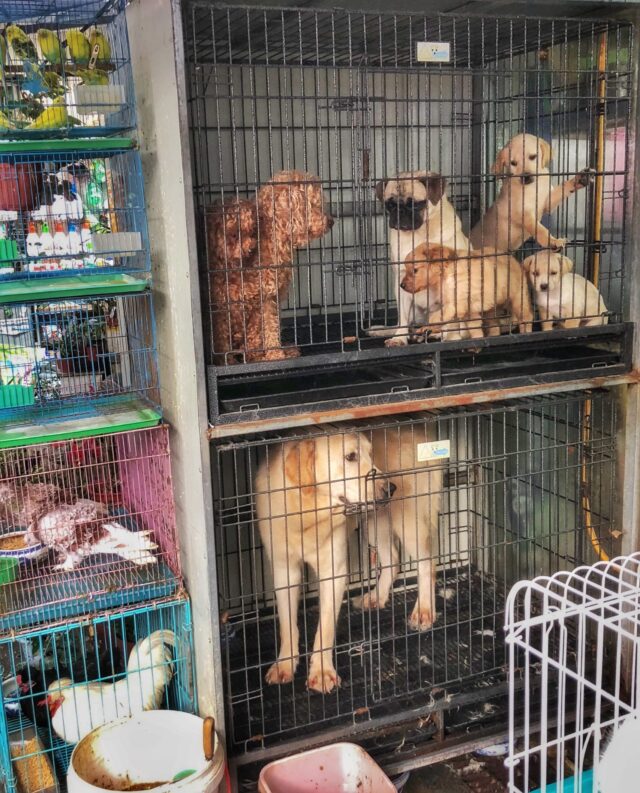Most dog parents know that puppy mills are horrific facilities, but not many people know how to go about stopping them. Anyone who truly loves dogs wouldn’t knowingly support these businesses. However, over 10,000 puppy mills, both licensed and unlicensed, still exist in the United States.
The big reason puppy mills are still successful is that a lot of people support them unknowingly. While many pet parent do their research before getting a dog, others make impulsive decisions based on emotion. Thus, if we want puppy mills to end once and for all, there are many things that need to be done.
Stopping puppy mills won’t happen overnight, but these 8 steps can help us get closer to that goal.

Ways to Stop Puppy Mills
It’s no secret that you shouldn’t buy a puppy from a puppy mill. Puppy mill dogs are usually sold through pet stores and online retailers so the breeders don’t have to show you where the dogs are bred. To ensure that you don’t accidentally support one of these businesses, keep an eye out for signs that a puppy is from a puppy mill.
Of course, getting a dog from a shelter, rescue, or reputable breeder is a great way to give puppy mills less business. However, you can still fight against puppy mills even if you’re not looking for a new dog.
1. Avoid buying anything (even supplies) from pet stores selling puppies.
It’s difficult to resist the cute face of a puppy in the window, but pet stores selling puppies usually source them from puppy mills. Reputable breeders want to see that their puppies go to a good home, so they don’t ship them off for someone else to sell. At a puppy store, you can’t see the parents of the puppies and where those puppies were bred.
Even if you get your dog from a reputable source, it is still important to avoid purchasing supplies from pet stores that sell puppies. Shopping at one of these shops helps supports the business’ bottom line, which in turn, supports puppy mills.

However, it’s important to note that some pet stores partner with local rescues and shelters for adoption events. Those stores don’t fall under the same category because the store is supporting an organization instead of selling the dogs themselves.
If you ever want more information about the sourcing of a puppy store, animal welfare organization Bailing Out Benji has compiled a list of puppy stores by state, showing where they’re getting their puppies from.
2. Introduce a Humane Pet Store Ordinance to Your City
One of the best ways to end puppy mills is to cut off their sources. Many cities and states across the United States have passed humane pet sale laws to prevent pet stores from selling dogs, cats, and rabbits. These ordinances don’t affect reputable breeders selling their own puppies or rescues holding events at pet stores. Instead, they stop pet stores from bringing in puppies for profit, which are sourced from puppy mills.
You can check this list to see if your city has passed one of these laws. If not, you could introduce one of these ordinances. Even if there are no puppy stores in your city, a new law would prevent new puppy-selling businesses from opening. Here are some basic steps for introducing one of these laws:
- Email your alderperson to ask if they will sponsor the ordinance. List some reasons to support the ordinance, such as preventing puppy mills from selling in your area, preventing residents from buying sick puppies, reducing the risk of zoonotic diseases spreading, and protecting residents from buying puppies with high interest rates.
- Gather support for the ordinance. Organizations like HSUS, Bailing Out Benji, and local rescues and shelters may sign on to a coalition letter.
- Encourage residents to speak in support of the ordinance at the council meeting. Councils are more likely to support an ordinance if they hear that many people in the community support it.

Introducing one of these ordinances can feel overwhelming at first, but each one passed is a huge success for animal welfare. You can contact Bailing Out Benji for help passing a humane pet store law.
3. If You Witness an Inhumane Breeding Business, Report it
If you witness a breeder mistreating their dogs, report it. In some instances, a puppy mill may be obvious, such as filthy living conditions, small enclosures, and visible wounds on the dogs. However, many sellers are prepared to hide it, so be wary of breeders who refuse to show you the parent dogs and where those dogs are bred. If you purchased a sick puppy from a pet store or breeder, reporting it may also help.
Here are a few places you can report suspected puppy mills to:
- Your state agency
- Bailing Out Benji
- Humane Society of the United States (HSUS)
- The USDA
Breeding laws in most states aren’t very strict, so unfortunately, reporting it won’t guarantee that a puppy mill will shut down. However, the more people that report a facility, the more likely that puppy mill will be held accountable.
4. Contact Your Legislators
Not everyone is aware of puppy mills, including people who may vote on these issues. So, consider emailing your legislators to let them know that ending puppy mills is important to you. If they see that a lot of people care about it, they may be more likely to vote in support of humane pet store laws. These emails may also encourage legislators to make breeding laws stricter (right now many puppy mills are legal and licensed).
If you’re unsure who your legislators are, you can find them here.

5. Write a Letter to the Editor
Sending a Letter to the Editor of a local news source can help get the word out. Even a few sentences about puppy mills can make a difference because many people looking for their first dog have no idea that puppy mills sell to pet stores. Here’s an example of a Letter to the Editor sent for Mother’s Day.
Also, if you notice ads for pet stores selling puppies, such as on the radio or at the movie theater, consider contacting the company running the ad. Let them know that you don’t want to support companies that support puppy mills. If enough people reach out, they may reconsider what they advertise.
6. Volunteer at Events
Volunteering is always a great way to help animals in need. When it comes to puppy mills, there are organizations like Bailing Out Benji that are always looking for volunteers. Some puppy mill-related events could include educational booths or peaceful protests.

Local rescues and shelters may take in puppy mill dogs, so you could donate or volunteer to help care for the dogs. If you’re able, fostering a puppy mill survivor is one of the best things you can do because you’ll allow them to experience a home environment for the first time.
7. Educate Others About Puppy Mills
Educating others is an easy task that can have a big impact. Thus, it’s one of the best methods for how to stop puppy mills. Here are a few ways you can spread the word about puppy mills:
- If you have a friend looking for a new dog, talk to them about puppy mills. Recommend reputable breeders, rescues, and shelters if you know any.
- Make social media posts about puppy mills (keep them public so friends can share them)
- Hand out fliers at events or local businesses (Here’s an example)
8. Share Your Dog’s Story
Some people don’t understand the severity of puppy mills without witnessing the effects they can have on a dog. So, if you foster or adopt a dog that was rescued from a puppy mill, share their story as much as you can. Seeing the fear these dogs have after what they’ve been through is what makes a lot of people passionate about this topic. Most dog parents already love to talk about their dogs as much as possible, but sharing a puppy mill dog’s story could encourage people to rethink where they get their dogs from.

Frequently Asked Questions
What is a Puppy Mill?
A puppy mill can be defined as any commercial breeding place that breeds dogs in poor conditions. Not all puppy mills look the same, but they all breed a surplus of dogs because they focus on profit more than animal welfare.
What are Signs of a Puppy Mill?
The easiest way to tell if someone is selling puppy mill dogs is if they won’t let you see the puppy’s parents or where the dogs are bred. However, there are lots of other signs, such as breeding many breeds at once, not knowing specific details about the breed, sending puppies home before 8 weeks old, and selling sick puppies.
Why is it Hard to Shut Down Puppy Mills?
Puppy mills are hard to shut down because they’re legal in most states. Many of them even have licenses. Some states don’t have any laws or restrictions for breeders while the ones that do are vague. The USDA only requires cages to be six inches longer than the length of the dog, which is not enough space for dogs to spend their whole lives. In many cases, the laws haven’t changed because it’s hard to find enough inspectors to enforce stricter rules.
Can Puppy Mill Dogs Be Rehabilitated?
Yes, dogs rescued from puppy mills can be rehabilitated, but they typically require patient adopters. Many dogs saved from puppy mills spent most of their lives isolated from humans, so it may take them a while to learn to trust people and do normal dog things like go for walks and play with toys. Yet, seeing them come out of their shells is the most rewarding experience.
Can Puppy Mill Puppies Be AKC Registered?
Like a USDA license, an AKC registration doesn’t guarantee that a dog came from good living conditions. Many puppies sold by puppy mills are registered by the AKC.
Which State Has the Most Puppy Mills?
Most states have some puppy mills in them, but the majority are in the Midwest. Missouri is known for being the state with the most puppy mills, and they always have a high number appearing on HSUS’s Horrible Hundred list.
What Happens to Puppy Mill Dogs That Don’t Sell?
Puppies from puppy mills that don’t sell are typically sent back to become breeding dogs. Breeding dogs that no longer serve a purpose at the mill may be killed, abandoned, or auctioned off. Luckily, many rescues and shelters find ways to save these dogs and rehabilitate them.
Should I Save a Puppy From a Puppy Mill?
No, buying a puppy from a puppy mill isn’t “saving” a puppy. Instead, you support the puppy mill by giving them a profit and freeing up space for them to breed more dogs. If you want to save a puppy mill dog, consider adopting one that has been taken in by a rescue or shelter.

Final Thoughts
Now that you know how to put a stop to puppy mills, consider taking action if you can. There’s no way to end puppy mills overnight, but if dog lovers keep stepping up in the ways mentioned, the number of puppy mills will decrease. Puppy mills still exist because people keep supporting them, so spreading the word and decreasing the number of places mills sell to could save so many dogs.
Featured Image: Facebook
 Toledo, United States.
Toledo, United States.